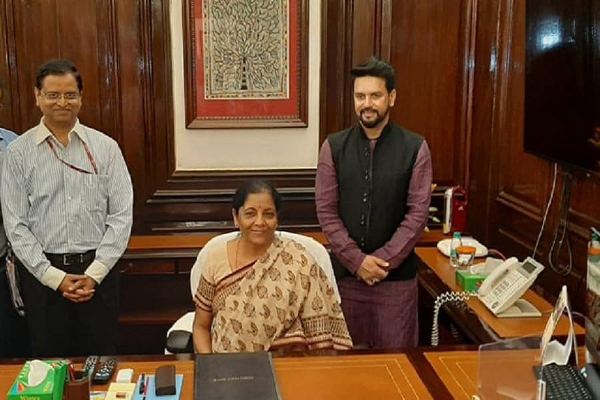New Delhi: India’s much-awaited new industrial policy is expected to be part of Friday’s Union budget, centring around the Make In India theme to re-industrialize the economy and create manufacturing jobs.
The industrial policy will include incentives to make India a manufacturing and exports hub at a time global manufacturers, troubled by the US-China trade war, are looking beyond Asia’s biggest economy, a government official aware of the development said on condition of anonymity.
The 5 July Union budget, to be presented by finance minister Nirmala Sitharaman, is the Narendra Modi government’s first after returning to power with a landslide majority.
“The policy, which may be part of the upcoming budget, will give a medium- to long-term direction to India’s growth trajectory,” said the official cited above.
The new industrial policy was ready by the end of the first term of the Modi government when Suresh Prabhu helmed the commerce and industry ministry; however, it was left to be announced after the general election, fearing its recommendations on labour reforms would have electoral repercussions. Incumbent commerce minister Piyush Goyal is said to have tweaked a few provisions in the policy after taking charge of the ministry.
In his address to a joint sitting of Parliament on 20 June, President Ram Nath Kovind said work was underway in earnest to transform India into a global manufacturing hub. “Keeping in view Industry 4.0, a new industrial policy will be announced shortly. In‘Ease of Doing Business’, India has leapfrogged 65 positions during the past five years, from a ranking of 142 in 2014 to 77. Now, our goal is to be among the top 50 countries of the world. In order to achieve this, process of simplification of rules will be further expedited in collaboration with the states. In this sequence, necessary amendments are also being brought in the Companies Law,” he said.
Answering a question in the Lok Sabha on 26 June, Goyal said the government was in the process of formulating a new industrial policy, which would be a road map for all businesses in the country. “In this regard, consultations have been held with stakeholders to get their ideas and feedback. Keeping in view all such inputs, a new industrial policy is under consideration of the government and likely to be finalized shortly,” he added.
In its pre-budget wish list, industry lobby group Ficci had suggested measures to reverse deindustrialization, enhance manufacturing employment and boost the Make In India programme. “Announce special industrial zones for manufacturing and exports with tax concessions and a light regulatory regime, introduce phased manufacturing programme (PMP) for more industrial items, as has been done for LED and mobiles. For example, PMP can be extended to manufacturing of air conditioners, medical devices, etc.,” it added.
A discussion paper on the industrial policy released in 2017 was critical of India’s restrictive labour laws, admitting they had been overly protective of workers in the formal sector. “Though labour protection and security are required, the flip side is that it discourages employers from hiring workers on a regular basis. It has probably also led to entrepreneurs choosing to stay away from labour-intensive sectors and opt for highly capital- or skilled labour-intensive technologies sectors,” it said.
On 24 July 1991, the government had announced a Statement of Industrial Policy, substantially reducing the requirement for industrial approvals and constricting the so-called licence raj. Subsequently, the National Manufacturing Policy was announced on 4 November 2011, aiming to grow the share of manufacturing in gross domestic product to 25% by 2022. In 2018-19, manufacturing accounted for 18% of GDP.
The new industrial policy will subsume the National Manufacturing Policy, but its objectives will be far wider and it will handle issues such as promoting emerging technologies; building an innovation-driven economy; promoting high-quality industrial infrastructure; providing enhanced access to affordable capital, especially for micro, small and medium enterprises; strengthening linkages between trade and manufacturing; enhancing skill development; and making it easier to do business.
The policy will also incorporate the use of smart technologies such as Internet of Things, artificial intelligence (AI) and robotics for advanced manufacturing. A commerce ministry task force on leveraging AI for economic transformation has already submitted its report. The task force, chaired by V. Kamakoti, a professor at the Indian Institute of Technology Madras, included academics, industry executives and government officials.
Source: LM
Image Courtesy:WeforNews
You may also like
-
Trade Connect E-platform For Exports Is Single Window, Fast, Accessible And Transformational: Shri Piyush Goyal
-
Dot Simplifies Approval Processes For Telecom Licenses And Wireless Equipment
-
Coal Production and Supply Trends on Positive Trajectory
-
Union Minister To Release Booklets On Promotion Of Indigenous Species & Conservation Of States Fishes
-
2nd India-Japan Finance Dialogue held in Tokyo on 6th September, 2024
